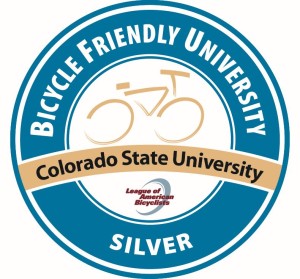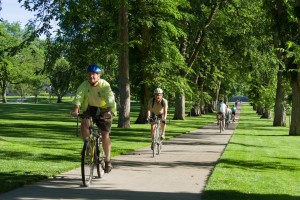What’s your way? Football fans arrive via multiple modes
After years planning so that major city streets would not be in gridlock on the day of a Ram home game, the first two games point to a transportation success.
After years planning so that major city streets would not be in gridlock on the day of a Ram home game, the first two games point to a transportation success.
Whether you are a seasoned cyclist, or thinking about trying a two-wheeled commute for the first time, there are a variety of opportunities on campus
Parking and Transportation Services is again hosting lunch-time bike rides for women throughout the summer.
Rams have multiple opportunities to brush up on their bicycling safety skills this month.
Bike to Breakfast stations will be on campus this September.
Tempted to ride a bike to work, but not sure if you’re up for navigating city traffic and all there is to know about safely riding to campus?
Parking and Transportation Services is launching a series of women’s only lunch-time bike rides
Colorado State University is aiming to become recognized as a premier Bike Friendly University, with a gold or platinum a rating given by the League of American Bicyclists.
Currently at silver status, awarded in 2011, Colorado State University is seeking consideration for a higher rating. The League of American Bicyclists evaluates university from across the nation each year.
The Bicycle Friendly University program recognizes university with infrastructure to support biking across and to campus, as well as universities that promote bicycling as a way to commute. Universities are evaluated for their bike share programs, educational efforts, and infrastructure to encourage biking, as well as bicycle safety enforcement.
“Colorado State University is proud of our accomplishments to make the campus more bicycle friendly since our application in 2011,” said Aaron Fodge, alternative transportation manager. “We hope to elevate our ranking to support our city’s ranking as a Platinum Bicycle Friendly City.” As part of the application process, Colorado State students, faculty and alumni are invited to complete a survey to share information with the League in support of CSU’s application.
https://www.surveymonkey.com/r/BFU_2015_93
The survey will be open through Friday, Sept. 18. The input received through this survey will help inform the final award decision and will inform feedback that CSU will receive later this fall.
As part of the application process, Colorado State students, faculty and alumni are invited to complete a survey to share information with the League in support of CSU’s application.
https://www.surveymonkey.com/r/BFU_2015_93
The survey will be open through Friday, Sept. 18. The input received through this survey will help inform the final award decision and will inform feedback that CSU will receive later this fall.
Faculty and staff 50 years and older can get Back on the Bike, thanks to a Kaiser Permanente grant. The grant, awarded to Parking and Transportation Services, supports a program to help faculty and staff become more comfortable riding a bike to work. The program, Back on the Bike, is now seeking participants for sessions starting the fall semester. The program, geared toward engaging more people in active transportation and physical activity, helps CSU employees who want to bike to work assess their health, tune up their bike, get safety gear, and learn tricks to travel in traffic and overcome other safety or comfort obstacles through personalized travel training. To qualify, faculty and staff must be at least 50 years old, live within a Fort Collins zip code, and want to commute by bicycle. Training helps with health, safety concerns Back on the Bike will offer faculty and staff travel training programs including:
Two grants awarded from CDOT will be implemented to improve Pitkin low-stress bicycle network as well as adding secured bicycle parking at transit centers. Colorado State has a long-term commitment to creating transportation options for faculty, staff, employees, students and visitors to campus. “These partnerships will bring projects that will help thousands of students and employees at CSU make the decision to travel to the university without their personal vehicle. We are excited about the impact these grants will bring to our community for years to come,” said Aaron Fodge, manager of Alternative Transportation at CSU.
Improving cross-city and campus bike routes, additional signage
The Pitkin Low Stress Bicycle Route is an east-west connection across the city for bicyclists, passing directly through the center of the CSU campus.
The City of Fort Collins, collaborating with CSU, will lead the effort to create a cross-city bicycle route, add critical improvements to the route through campus, as well as create a bike signal crossing at Shields and intersection improvements at College.
This route currently serves 1,200 CSU employees and more than 5,000 students who live within a half mile of this corridor. When completed, cyclists can travel more safely east-west to and through campus.
Bicycle parking structures at transit facilities
A partnership with Boulder County will construct long-term bicycle parking structures at transit facilities across the transportation corridor, connecting Longmont, Boulder and Fort Collins to improve connections between bicycling and transit.
Secure bicycle parking facilities will be placed at the University Station of Mason corridor to allow transit riders leave their bike at the stop and then complete the rest of their journey via MAX.
“With two bike parking structures in Fort Collins and two more in Boulder, commuters will have the necessary infrastructure in place to rely fully on alternative transportation, which will ultimately increase bicycling activity by allowing more people to get to their bus stop via bike,” Fodge said.
“These partnerships will bring projects that will help thousands of students and employees at CSU make the decision to travel to the university without their personal vehicle. We are excited about the impact these grants will bring to our community for years to come,” said Aaron Fodge, manager of Alternative Transportation at CSU.
Improving cross-city and campus bike routes, additional signage
The Pitkin Low Stress Bicycle Route is an east-west connection across the city for bicyclists, passing directly through the center of the CSU campus.
The City of Fort Collins, collaborating with CSU, will lead the effort to create a cross-city bicycle route, add critical improvements to the route through campus, as well as create a bike signal crossing at Shields and intersection improvements at College.
This route currently serves 1,200 CSU employees and more than 5,000 students who live within a half mile of this corridor. When completed, cyclists can travel more safely east-west to and through campus.
Bicycle parking structures at transit facilities
A partnership with Boulder County will construct long-term bicycle parking structures at transit facilities across the transportation corridor, connecting Longmont, Boulder and Fort Collins to improve connections between bicycling and transit.
Secure bicycle parking facilities will be placed at the University Station of Mason corridor to allow transit riders leave their bike at the stop and then complete the rest of their journey via MAX.
“With two bike parking structures in Fort Collins and two more in Boulder, commuters will have the necessary infrastructure in place to rely fully on alternative transportation, which will ultimately increase bicycling activity by allowing more people to get to their bus stop via bike,” Fodge said.